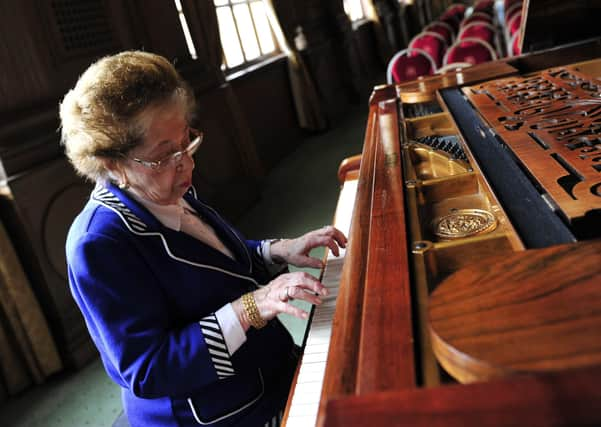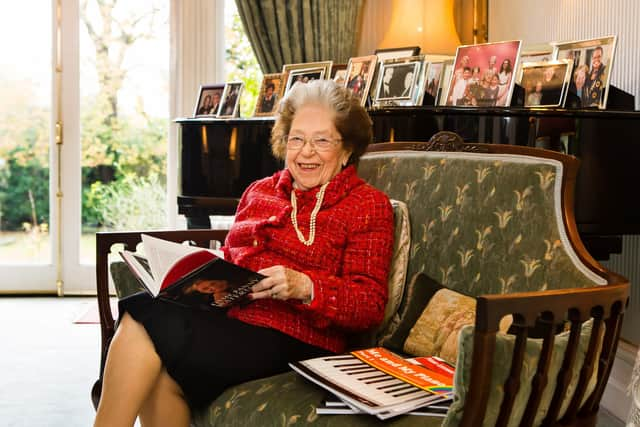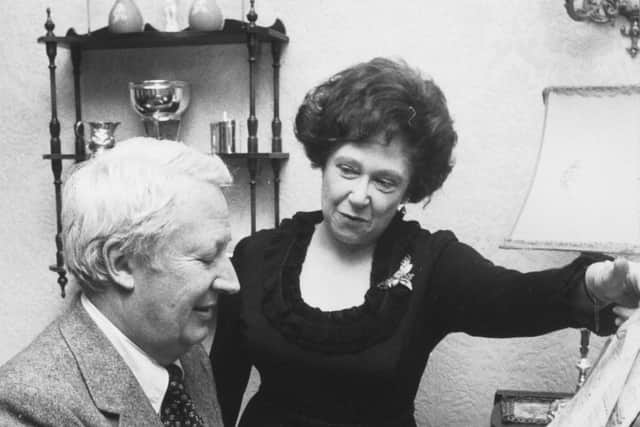Dame Fanny Waterman talks about her remarkable life in music as she turns 100


Photographs of family, pupils and great classical music figures cover the two Steinway pianos that dominate the lounge of her elegant Leeds home.
More photos line the walls of her cloakroom – of composers, conductors, former Prime Minister Edward Heath playing one of the pianos, of unforgettable moments at the Leeds International Piano Competition, which she conceived in 1961 and which developed into the world’s leading event of its kind.


Advertisement
Hide AdAdvertisement
Hide AdBy then, the musical establishment held her in awe as a teacher with an inspirational ability to nurture the talents of budding concert pianists. Six years earlier, in 1955, The Times had termed her “a legend”. That cutting is on display too, as is a letter from the founder of the Proms, Sir Henry Wood, praising Dame Fanny’s brilliance as a pianist at the start of a concert career in Leeds in 1941.
The Leeds International Piano Competition had planned a day of public events to celebrate her 100th birthday today, however, these were cancelled in the wake of growing concern relating to the spread of coronavirus.
Dame Fanny remains a stoic figure, and as befits somebody who only relinquished day-to-day control of the “Leeds” (as her competition is known internationally) at the age of 95, she had been closely involved with every detail of her birthday celebration.
“I never thought I’d arrive at the age of 100,” says Dame Fanny. “That is very remarkable, and it’s because I had a wonderful husband. He was a marvellous doctor, and he knew how I should go on. I didn’t go to bed late, I didn’t drink and I didn’t smoke.”


Advertisement
Hide AdAdvertisement
Hide AdHer early life was a world away from the glitter of a gala dinner. She was the daughter of a poor, Russian-born jeweller in Leeds. Her parents scraped together enough for piano lessons when she showed exceptional promise. “My father put together pearls and diamonds and rubies in beautiful styles, but he realised that however good he was, there might have been people who were better. Once you realise that, then you’re on the way to success because it makes you strive to become better.
“I think that’s important. I was never too cocky about my achievements and never told my father I was a genius. I was not a genius, I was a highly gifted child. I had a lot of talent.
“It’s knowing in your heart of hearts where your talent can take you, and with that goes a certain personality. It’s no good being cocky about yourself. Be humble, listen to other people.”
She then won a scholarship to the Royal College of Music. “I was noticed by Sir Henry Wood, who wrote a wonderful letter to me to say he was so impressed.” The scholarship led to a flourishing concert career. In 1944, she married Geoffrey de Keyser. He died in 2001, a few weeks short of their 57th wedding anniversary.
Advertisement
Hide AdAdvertisement
Hide AdWhen the first of their two sons was born in 1950, Dame Fanny decided against the constant touring that performing would involve, and concentrated on teaching, quickly establishing an international reputation.
Sound and the interpretation of the great composers’ intentions were paramount to her.
“Beethoven, Brahms and Schubert reside in heaven with the gods,” she says. “They’re there for people to read them, to go to concerts, to examine them. The manuscripts are not music, they’re dots and dashes. But when you have wonderful new players, it turns into real music. Without the right sound, you’re nowhere near what the composers intended, you’re playing notes, and that’s a different thing from the sound, whether it’s the drama, or sounding happy.
“It’s not what you play, it’s how you play it. It’s how quietly you can play. It’s not bang, bang, bang all the way through. Music is sometimes very, very introspective, you feel sad, yet something comes over you, someone’s inspired you, and you manage to find the courage to continue with your work. When all the elements come together, you get a glimpse of heaven on earth and that is what I have had, and what I hope I’ve inspired other people to do.” Dame Fanny only stopped giving formal lessons a few months ago, but her influence is still felt around the world in the Me and My Piano series of textbooks, co-authored with her friend Marion Thorpe, which have sold in their millions. A special edition has been published to mark her birthday.
Advertisement
Hide AdAdvertisement
Hide AdMarion – a celebrated concert pianist herself – helped Dame Fanny get the “Leeds” off the ground, in the face of scepticism that the city was the right place for such a showcase.
Dame Fanny says: “I had courage when people said, ‘It won’t work in Leeds’. Even my darling husband said that and I said ‘I’ll show you’. I rang up Marion and she said ‘Let’s try’. That was the ambition I learned from my parents. My father was concerned about style and ability and never produced anything that was shabby, and I used to try to emulate that. You can either do nothing with your world, or you can say to yourself ‘I’m going to strive in everything for betterment’.”
From the first competition in 1963, the “Leeds” grew into one of music’s most prestigious events, discovering some of the most admired pianists of modern times, among them Murray Perahia, Radu Lupu, Dmitri Alexeev, Andras Schiff and Mitsuko Uchida. It put the city on the map of the international classical music scene. As its chairman and artistic director, Dame Fanny oversaw every detail, listening to recordings of all the entrants before deciding who should perform.
She raised nearly all the funds to stage the competitions from her extensive contacts and hosting musical events at her home.
Advertisement
Hide AdAdvertisement
Hide AdShe was awarded a series of honours for her towering contribution to music – the “Leeds”, her masterclasses, her work as a judge in other music competitions and her teaching. There was an OBE in 1971, CBE in 2000 and in 2005, she was made a Dame. She was also made an Honorary Freeman of the City of Leeds.
She says: “I was influenced by the greatness of so many people I met. I thought, if I’ve done my best, I might rise to the top. All these people I met had a kind of influence on me to behave as well as I could, to express my feelings about people, and hope for the best – and it happened.
“If everything you do is to the best of your ability, then one day you might get there, and that’s what did happen to me. People don’t strive enough. It’s a learning process that never ends, no matter how old you are. Without a doubt, I’m still learning.”
Comment Guidelines
National World encourages reader discussion on our stories. User feedback, insights and back-and-forth exchanges add a rich layer of context to reporting. Please review our Community Guidelines before commenting.